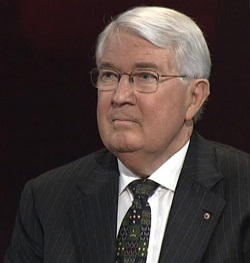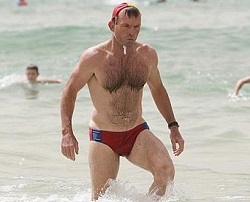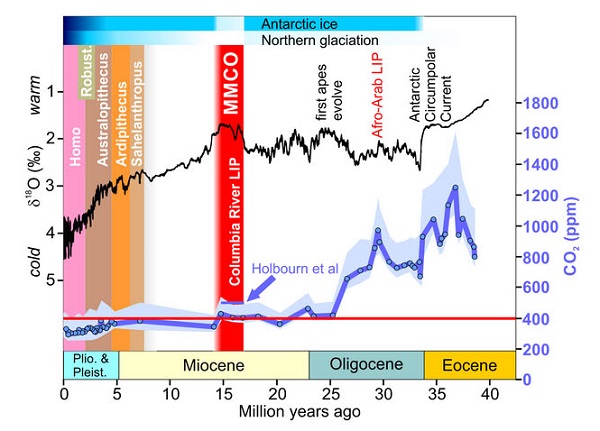The law says that the Renewable Energy Target (RET) should be reviewed every two years, so a 2014 review is mandatory.
The law also says that the review should be undertaken by the Climate Change Authority (CCA), which still exists courtesy of the senate. The CCA in a draft report on the emissions target suggested the current 5% emissions reduction target was not enough if we are to pull our weight in the world. In the text they appeared to favour a 25% target, but recommended at least 15% pointing out also the an additional 4% could be added courtesy of Kyoto credits.
I believe the RET has been one of the more successful factors in restraining emissions.
Giles Parkinson reported two months ago now that the RET Review will be headed by Dick Warburton, a climate change “denier”. Warburton told RN’s AM program that the science was not settled.
I am not a denier, nor a sceptic actually, of climate change per se. What I am sceptical is the claims that man-made carbon dioxide is the major cause of global warming. I’m not a denier of that, but I am sceptical of that claim.
When asked whether he believed renewable energy had its role to play in Australia’s energy mix Warburton replied:
Yes it does. Renewable energy does have a place to play. The review is asking us to look to see whether it is an efficient and effective way of doing it as we’re doing it at the moment.
 I understand he did overtly oppose carbon pricing.
I understand he did overtly oppose carbon pricing.
In my opinion Warburton is a denier. Given the degree of certainty in the science you either accept the science or deny it. There’s no room left for fence sitting. That being said, Warburton had a fine reputation as a businessman leading Dupont’s Australian operations, was used by the Keating government in industry renewal, has been a member of the Reserve Bank board and has had various company board roles.
It has emerged that Warburton has been the subject of an investigation into his role as a former director of a firm involved in Australia’s worst foreign bribery scandal. I would suggest that Abbott has done his due diligence and found him in the clear.
Both Abbott and Macfarlane have been emphasising their concern over renewables contributing to the cost of electricity. A second panelist is Matt Zema, the CEO of the Australian Energy Market Operator. As such he was responsible for a study recently
that found 100 per cent renewables would be possible in Australia, and concluded that the cost of electricity would be little different to business as usual, although AEMO declined to do a full cost analysis.
Greg Hunt parrots his boss’s concerns:
“We are a government that is unashamedly doing our best to take pressure off manufacturing and households through anything that can lower electricity prices,” he said in a theme frequently repeated by the conservative government.
If they are concerned about the future cost of electricity they could begin by looking at the policy of privatisation, found to be “a dismal failure” by Professor Quiggin.
A third panel member, Shirley In’t Veld, is the former head of WA government owned generation company Verve Energy which
has had a history of snubbing renewable energy and chose instead to invest in the refurbishment of the ageing Muja coal-fired generator. The refurbishment has proved to be a financial disaster, with the WA government admitting that nearly $300 million had gone down the drain.
The fourth member is Dr Brian Fisher, the former long-term head of ABARE until he left for private enterprise in 2006 to head up a fossil fuel lobby group, Concept Economics. At ABARE he gained notoriety for his positions on climate policies and is a noted free-market hardliner. Under Fisher:
ABARE was responsible for the infamous “MEGABARE” model that made Australia a laughing stock in connection to the Kyoto negotiations.
Sounds like a merry crew, Abbott’s idea of ‘balance’, and bound to add to the climate recalcitrance now so common in the Anglo-Saxon world.
There is a question as to whether the LNP deliberately lied and misled the public prior to the election. The SMH cites specific bi-partisanship as late as July 2013. Labor’s view:
“At every possible point, they tried to assure the community that there was a bipartisan consensus around the RET, and therefore the growth of renewables,” Labor climate change spokesman Mark Butler says. “What’s clear now is that it was just an utter falsehood.”
Albo:
“They made it very clear; Greg Hunt staked his reputation on the maintenance of the renewable energy target,” he told said in the island state of Tasmania.
“It’s important for jobs. It’s important in terms of positioning Australia as a clean energy economy into the future.
“We’ll wait and see what they do but we’ll be holding them to account,” Mr Albanese said.
Update: Giles Parkinson tells how the Warburton Review is getting down to business today by looking at what the RET of 20% means. Presently it is a number – “41,000GWh of large-scale developments and an uncapped amount of small-scale generation”. It seems that more than half of that number can be made to disappear by changing definitions.
 Continue reading Abbott’s ‘Daring to doubt’ – how does the science stand up?
Continue reading Abbott’s ‘Daring to doubt’ – how does the science stand up? 



